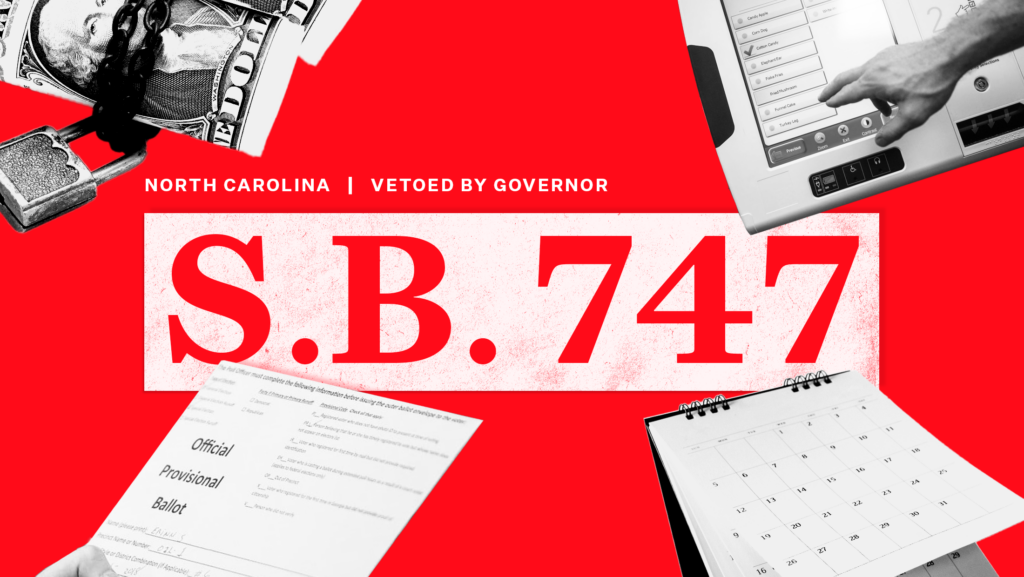Unpacking North Carolina Republicans’ Voter Suppression Bill S.B. 747

Although Republicans have held control of the North Carolina General Assembly since 2011, Gov. Roy Cooper’s (D) veto pen and a Democratic-controlled state Supreme Court have helped prevent most election law changes from going into effect. However, those two bulwarks no longer stand against Republican voter suppression.
Last year, Republicans gained a majority on the state Supreme Court, and earlier this year one recently elected legislator, Rep. Tricia Cotham (R-Mecklenburg) defected from the Democratic party, giving Republicans a veto-proof supermajority in the Legislature.
Republicans didn’t waste much time before they took advantage of both of these developments. At the beginning of June, they introduced an omnibus voter suppression law, Senate Bill 747, and advanced it on a party-line vote in both chambers. Now, nearly two months after its introduction, Cooper used his executive power to veto S.B. 747.
In announcing his veto, Cooper slammed against the Republicans, calling out their thinly veiled goals and stating, “Right now, legislative Republicans in North Carolina are pushing an all-out assault on the right to vote, using the advice of Trump’s hand-picked election denier Cleta Mitchell who was on the call trying to help him overturn the election in Georgia.”
The omnibus legislation would make voting in the Tar Heel State more difficult.
S.B. 747 would create a myriad of new voting restrictions. Critically, Republicans crammed in two proposals that Cooper previously vetoed: banning private grants for election administration and moving up the deadline to receive mail-in ballots from three days after Election Day to 7:30 p.m. on Election Day. Drastically shortening the mail-in ballot return window could disenfranchise over 10,000 voters.
The bill would also launch a pilot program for signature verification of mail-in ballots during the primary held in 2024 throughout 10 counties with the understanding that the requirement could become permanent if the pilot results are positive.
Republicans had tried to implement the change last year through a lawsuit after the North Carolina State Board of Elections declined to issue rules requiring signature matching. In the pilot program, signatures on mail-in ballots would be compared with those on file — even though North Carolina law already requires two witnesses to sign all mail-in ballots. It is important to note that other states have found the verification to be finicky and the practice is highly litigated.
Other restrictive changes in the bill include:
- Banning private funding for election administration,
- Shortening the timeline to return mail-in ballots from three days after Election Day to 7:30 p.m. on Election Day,
- Transferring election crime investigations to the State Bureau of Investigation,
- Excluding any missing witness information from the categories of “curable deficiencies,”
- Allowing poll observers to freely move around polling locations, listen to conversations between voters and election officials and take photographs,
- Extending the deadline for challenging mail-in ballots from Election Day to five business days after Election Day,
- Creating a procedure to identify noncitizens and remove them from the voter rolls — an often flawed process that can implicate eligible voters,
- Tightening an address confirmation process that could lead to voters having their registrations canceled by requiring notices to be sent to voters who didn’t vote after each congressional election and
- Requiring same-day registrants during the early voting period to vote on a “retrievable” ballot after providing required documentation at the polls. These votes would only be counted if the U.S. Postal Service is able to verify the voter’s address via a deliverable notice prior to the start of county canvass, which begins 10 business days after Election Day.
Critically, the provision that allows for challenges to mail-in ballots has been expanded to allow voters to challenge ballots in their entire county. Previously, voters could only challenge mail-in ballots from their same precinct. This expansion is worrying in light of similar changes to the challenge procedure in Georgia, which enabled a vigilante culture of mass challenges.
Last week, as House members debated amendments to the bill in the Election Law and Campaign Finance Reform Committee, Democratic representatives raised numerous concerns about the impact the bill’s provisions would have on voters. Rep. Pricey Harrison (D-Guilford) cited barriers that students might face in producing the necessary documents to participate in same-day registration.
Rep. Joe John (D-Wake) argued against the shortening of the absentee ballot return deadline to election night and proposed a failed amendment that would have re-established the three-day grace period, stating, “We hear a lot of talk about integrity in elections. Integrity in elections should include an opportunity for responsible conscientious absentee voters who have followed the rules to have their vote counted and not being discarded through no fault of their own.”
In response to Rep. John’s amendment, which highlighted how critical it would be to educate voters on the numerous changes, Rep. Cynthia Ball (D-Wake) proposed an amendment that would have appropriated $2 million for voter education. This amendment also failed the Republican-controlled committee.
What’s next for S.B. 747?
The voter suppression bill now awaits an overriding vote from both chambers of the Legislature. If Cooper’s veto is overridden, the bill would become law without the governor’s signature and drastically alter the state of North Carolina’s elections ahead of 2024.